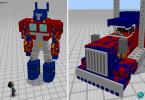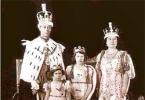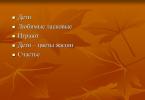Denoting living things (cat, tiger) and inanimate (chalk, rice, gold).
The grammatical characteristics of this LGR are different. Personal nouns, since they call a person, they have only 2 genders (m.p. and f.r.): carpenter, excellent student, Spanish. Exception: child, person, child(cf.) There are 3 genders in non-personal nouns: horse, chalk(m.r.), river, love(female), window, movement(cf.).
Personal and impersonal nouns do not form closed rows. There is a small group of words that, depending on the context, can refer to personal or impersonal nouns: bag, stump, type,mattress and etc. ( Instead of a birch, a stump stuck out(non-personal). Well, you and the stump(personal).).
specific nouns.
They name specific objects, facts, living beings. They form the basis of nouns. Distinctive: freely combined with cardinal numbers, i.e. subject to counting: 1 board, 5 girls; have a numerical correlation ( student - students, spring - spring). All these features are not typical for abstract, collective and real nouns. Specific nouns do not have derivational signs.
Abstract (abstract) nouns.
Abstract concepts are called (quality, property, action, state): whiteness, lightness, heroism, achievement, pain; and also name various currents and directions, scientific disciplines: acmeism, Marxism, linguistics, literary criticism, realism.
Distinctive features: are not counted (one cannot say: 3 lightness, 2 literary criticism), are used in the singular.
Formed with the help of suffixes - awn / - is (pride, freshness)- to (a) ( forging, cleaning)- ev(a) ( blue),- in (a) ( depth, height)- from (a) ( redness, kindness)- out (a) ( novelty, whiteness)
Ø( height, breadth),-stv(o) ( persistence, flight)- enij ( disarmament),-nij ( diligence),- and j ( zeal),- acij ( agitation), - ism ( structuralism), - b(a) ( mowing, shooting).
Abstract nouns can also be unmotivated: buzz, grief, melancholy, life, laziness, comfort, etc.
Sometimes abstract nouns can be used in the plural form: troubles, torments, beauty, passions. At the same time, their semantics changes: the idea of abstraction is erased, the manifestation of qualities, properties, actions, and states is concretized. Abstract nouns move into the category of concrete nouns.
Collective nouns.
They designate a set of homogeneous objects as an indivisible whole: foliage, shoes.
Distinctive features: not combined with cardinal numbers; have only singular forms; can be combined with indefinitely quantitative words (many, few), fractional numbers, as well as with words denoting the ratio of part and whole: a lot of poor people, few needles, ½ tops, a lot of little things, all relatives.
Word building signs: are formed with the help of special suffixes - ur (a) (professorship), - stv(o) / - stv(o) ( merchants, students), -Ø ( game), - j – ( rags, officers),- n(i) (relatives),- from (a) (poor),- nickname (spruce forest),- nyak (willow).
All collective nouns are divided into 2 groups: non-derivative (dishes, rubbish, furniture), in which the meaning of the collective is expressed lexically, and derivatives ( kids, hazel), in which the meaning of collectiveness is expressed using suffixes.
From collective nouns it is necessary to distinguish between words that, although they denote a set of objects, do not have the grammatical characteristics of collective nouns; they are combined with cardinal numbers and have a numerical correlation: people, troupe, regiment and etc.
Love, hate, admiration, friendship, jealousy... "These are feelings," you say, and you will be absolutely right. But there is something else: all these words denote states, concepts that cannot be reached, touched and cannot be counted. In other words, these are abstract (or abstract) nouns.
And the last - real nouns, which denote substances that are homogeneous in composition, in mass, and even if they are divided into parts, they retain the properties of the whole. Usually they cannot be counted. Just measure. For example: beef, water, dough, sour cream and others. Accordingly, they do not change in numbers, they are not used with cardinal numbers.

Language level
We continue the discussion about the role of abstract nouns in the language, in reflecting reality. Many linguists believe that the four categories of nouns listed above are, in fact, four levels of reflection of reality in the language: linguistic, philosophical, natural science and cognitive. On each of them, only one category appears exceptional and is opposed to the other three.
For example, it has already been mentioned above. In this plane, concrete nouns are opposed to abstract, real and collective ones, since only they name countable objects and are freely used both in the singular and in the plural. The rest are uncountable objects.
But since this article describes an abstract noun, then we turn to the philosophical level of reflection of reality, since it is here that its undivided reign begins.

Philosophy
At the philosophical level of reflection of reality, all existing objects are divided into ideal and material. Accordingly, an abstract noun, which names ideal, abstract objects, stands on the opposite side of concrete, real and collective names. After all, this trinity means in its bulk something material and sensually perceived.
Therefore, abstract nouns (examples follow) are a unique category, the exclusivity of which lies in the fact that only it gives a name to such intangible substances as: 1) an abstract property, a sign of an object (ease of flight, running, being, bag); 2) abstract behavior, action, activity (acquisition of a father, teacher, scientist; acquisition of a house, book, real estate); 3) an abstract mood, feeling, state, appearing in different situations(hatred for the enemy, for the world, for a friend; stagnation in relationships, in the country, in work); 4) something speculative, spiritual, which exists only in the human mind and cannot be visualized (unscrupulousness, justice, spirituality).
To the question What are abstract nouns? given by the author ღ Torunyaღ the best answer is attracted nouns denote various abstract concepts, qualities, actions, states in abstraction from the carrier of the sign and the producer of the action: beauty, dexterity, courage, development, enthusiasm, mowing, elasticity, slush, whiteness, cold, warmth.
Grammatical features of abstract nouns
1. Do not form number forms.
Can be only one or only plural. In other words, these are nouns that do not change in numbers.
Only ed. numbersOnly many numbers
laughter, noise, silence, fear
shine, fight, fuss, run
community, goodness, captivity
elections, holidays
twilight, weekdays
2. Not combined with cardinal numbers.
3. Some abstract nouns can be combined with the words many / few and at the same time stand in the singular form: a lot of attention, a lot of joy, a little grief.
Many, many restless
He will bring it with him.
(P. P. Ershov)
Derivative suffixes of abstract nouns
1. Abstract nouns formed from adjectives and verbs with the help of zero suffixation.
Adjective → noun
green - greenØ, blue - blueØ
bitter - bitternessØ
Verb → noun
translate - translateØ, go -
transitionØ, sign - signatureØ
2. Abstract nouns formed with the help of special suffixes.
-awn-
courage, bravery, wisdom
-is-freshness
-stv-
boasting, arrogance
-ism-
realism, heroism, patriotism
-providing-pleasure [j]e
-from-
kindness, generosity
-out-
whiteness, curvature, novelty
-enij-
patience [j]e, imagination [j]e
-anij-punishment [j] e, knitting [j] e
-tij-
development [j]e, events [j]e
-acyj-
orientation [j]i, nomination [j]i
Unmotivated nouns make up a small part of the abstract ones: sadness, passion, sadness, misfortune, comfort, torment, grief, mind.
To denote specific manifestations of abstract qualities, plural forms can be used: cold - winter colds, depth - sea depths, beauty - the beauties of nature, reading - Pushkin's readings, joy - the joys of life.
Valgina N. S., Rosenthal D. E. and Fomina M. I. believe that at present, abstract nouns tend to expand the scope of the use of plural forms: agreement, reality, heterogeneity, givenness. This also applies to verbal names with the meaning of action: sales, watering, shooting, emissions.
Answer from MANECHKA FEVRALYOVA[newbie]
Nouns used to denote abstract concepts qualities, actions and states are called abstract, or abstract (whiteness, mowing, beauty, shooting, development, slush, warmth, enthusiasm, cold, etc.). Grammatically abstract (abstract) nouns are characterized by the fact that their predominant part has only singular forms (brilliance, noise, fuss, silence, community, patience, good, evil, etc.). Only a few of the abstract nouns can be used in the plural when concretizing the meaning (the joys of life, the beauty of nature, noises in the heart, etc.). Some abstract nouns have only plural forms (more precisely, they are grammatically designed as plural nouns): holidays, twilight, etc. Currently, there is a tendency to expand the scope of the use of plural forms for abstract nouns (such as reality, givenness, agreement, heterogeneity). The range of words that can take these forms has increased significantly. This partly reflects the desire of the language for greater accuracy and concreteness of the statement. This is especially noticeable in a special language (for example, acclimatization of fish). Another group of words that actively take on plural forms are verbal names with the meaning of action (watering, throwing, selling, shooting). Distributed in the field of industrial, agricultural and military activities.
Hello, dear students of Argemona! Did you get to this lecture? Glad to see you all!
Today, the topic of our lesson, perhaps for some, will be quite difficult, because about our own and common names nouns are often heard by everyone, but those that we will talk about today are heard very rarely and, in the end, they are forgotten. But the magic of using specific words directly depends on the existing knowledge about these words. Therefore, let's be patient and proceed to the joint study of the names of concrete, abstract, collective, real nouns. In fact, the topic is not so complicated.
specific nouns are those that can be combined with quantitative (collective) and ordinal numbers. I hope everyone remembers what it is? Cardinal numbers are the number of items: one, two, two hundred, one hundred, etc. Collective - two, three ... Ordinal - first, second ... Therefore, specific nouns are the names of objects (leaf, tree, table), specific actions (jump, flight), facts and phenomena of reality (lesson, duel). Most of these nouns have the forms of both numbers. The only exceptions are the names of paired items: trousers, scissors.
Abstract (abstract) nouns - these are the names of abstract concepts - properties, qualities, actions, states: mind, joy, wisdom, compassion. Such nouns, as a rule, do not form a plural form and cannot be combined with cardinal numbers. However, some of them have the ability to combine with indefinitely quantitative words: a lot of joy, little wisdom, a little happiness.
Collective nouns designate a set of homogeneous in some respect persons (youth), objects (furniture), animals (young animals), insects (gnats), plants (leaves, raspberries), etc., presented as a single whole. They are used only in the singular form and cannot be combined with cardinal numbers, but it is possible to use them with indefinitely quantitative words (little leaves) and with fractional numbers (one third of the youth).
Nouns similar in semantics to them such as "regiment", "flock", "grove", "pile" are not collective.
Task 1. What nouns are "regiment", "flock", "grove", "pile"? Prove it.
The sign of collectivity is indicated by suffixes: -j- (linen), -stv- (wealth), -nik- (spruce forest), -nyak- (birch forest), -ur- (professorship), -itet- (generals), -v - (foliage), -n- (relatives), -ot- (poor), -hedgehog (youth).
Real nouns
include the names of substances homogeneous in composition: food products(flour), materials (cement, calico), minerals (coal, gold), chemical elements(uranium), drugs (aspirin), plants (wheat, potatoes), berries (raspberries) and other homogeneous divisible masses.
They can be used either in the singular form (water, cabbage) or in the plural form (ink, pasta, perfume).
They cannot be combined with quantitative numbers, but they can be combined with words denoting a measure of quantity: a liter of water, a gram of gold, a bed of cabbage, a pack of pasta, a bottle of perfume.
When it changes lexical meaning real nouns can be plural. For example, mineral waters (it means different types of water), sands, snows (occupied space).
Task 2. To understand how you understood these nouns, give 3 examples for each type. Make up sentences with them, illustrating the application of the knowledge gained.
Now let's try to understand the magic of these nouns. Here's the text for you:
Helmet, yes armor, yes saddle, bandage, balm, lotion.
There is such a craft - a lone knight.
Travel here and there, help someone out.
And all the time act yourself - that's the whole work.
The right, if you think about it, is folly.
Beating the butt with a whip - what kind of quixoticism?
Then you will leave as a mortal - no sense.
Only you will perish for nothing - that's all for a short time.
Task 3. Find nouns in this text and determine what they are. What role do specific nouns play in the text? Which lines resemble phraseological units? Which?
And here is another text:
From here I can see a low house with a gallery of small blackened wooden posts going around the whole house so that during thunder and hail you can close the shutters of the windows without getting wet with rain. Behind him fragrant bird cherry, whole rows of low fruit trees, sunk by the crimson of cherries and a sea of plums, covered with a lead mat; spreading maple, in the shade of which a carpet is spread out for relaxation; in front of the house there is a spacious yard with low, fresh grass, with a trodden path from the barn to the kitchen, and from the kitchen to the master's quarters; long necked goose, water drinker with young and tender as fluff goslings; a palisade hung with bundles of dried pears and apples and ventilated carpets; a wagon with melons standing near the barn; the unharnessed ox lying lazily beside him - all this has an inexplicable charm for me ...
And now for this text. It will be big.
Task 4. Choose nouns from the text and indicate those that help paint a picture. What category do they belong to?
Then write down the nouns with diminutive suffixes. What is their role in the text?
Find metaphors and comparisons. What part of speech are they?
Now point out the nouns that paint the picture. Remember that nouns can explicitly name a color, or they can simply be associated with it.
And finally, here is a thought that completes our topic:
“The category of a noun is of great importance for our thought. Without it, no knowledge, no science would be possible. It would be impossible, for example, to talk about light, or heat, or electricity, or life, or the state, or language itself: after all, none of this exists separately.
Task 5. What category of noun is being referred to here? Do you agree with this? A few of your thoughts on this.




